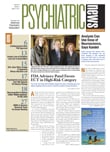The Executive Committee of the APA Board of Trustees, continuing APA's tradition of support for women's reproductive rights, voted January 11 to join an amicus curiae brief challenging an Illinois law that requires physicians to notify an adult family member of a pregnant minor before performing an abortion. The law, passed by the Illinois legislature in 1995, has never gone into effect because of procedural delays and numerous legal challenges.
Plaintiffs in the case, Hope Clinic for Women Ltd. v. Adams, assert that the law violates the Illinois state constitution, which contains an express right to be free of "invasions of privacy" and also forbids discrimination on the basis of sex. The plaintiffs are looking to the state constitution because the U.S. Supreme Court has found that parental notification requirements, with appropriate safeguards, are legal under the U.S. Constitution.
But Columbia University Professor of Psychiatry Paul Appelbaum, M.D., chair of APA's Committee on Judicial Action, told Psychiatric News, "The wording in the Illinois constitution is stronger and more explicit than in the federal constitution."
Appelbaum added, "APA has a very strong position on women having access to abortion and other family-planning methods. There are huge mental health implications to women having control over their own reproductive activity."
David Fassler, M.D., a child psychiatrist, APA's treasurer, and clinical professor of psychiatry at the University of Vermont College of Medicine, added, "APA's involvement is particularly relevant since questions have been raised concerning abortion and mental health. The arguments presented are consistent with established APA policy. They underscore our commitment to preserving access to the full range of reproductive health care services, including abortion."
APA was invited to join the brief by the Reproductive Rights Project of the American Civil Liberties Union of Illinois. Also supporting the amicus brief are the American College of Obstetricians and Gynecologists, the American Medical Women's Association, the Illinois chapter of the American Academy of Pediatrics, and the Society for Adolescent Medicine. A number of other medical associations have been asked to join the amicus brief as well.
The amicus brief focuses on the implications of the Illinois law for the health of pregnant young women. The brief says, "The Act significantly jeopardizes the health of minors seeking abortions in Illinois and interferes with the legal and ethical obligations of physicians to protect their patients' health."
The brief responds to an earlier amicus brief filed by some Illinois legislators represented by Americans United for Life (AUL), who support the parental-notification law. They argue that abortion creates short-term and long-term risks to the physical health of the pregnant minor, as well as psychological risks.
APA's 2009 position statement "Abortion and Women's Reproductive Health Care Rights" reaffirms APA's opposition to "all constitutional amendments, legislation, and regulations curtailing family planning or abortion services to any segment of the population" and "affirms that the freedom to act to interrupt pregnancy must be considered a mental health imperative with major social and mental health implications." APA has opposed parental notification statutes in several prior cases as amicus curiae.
